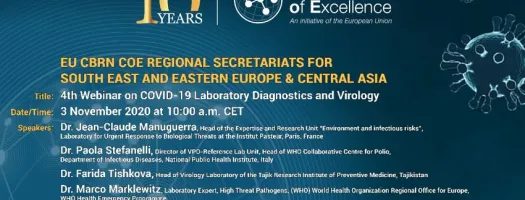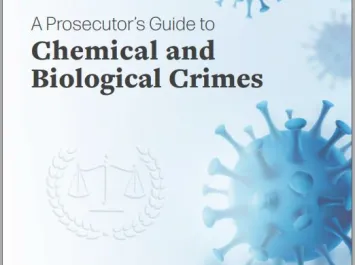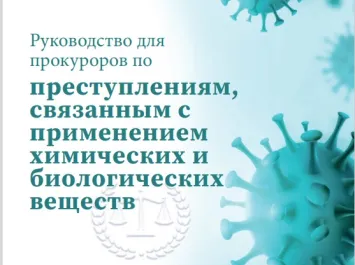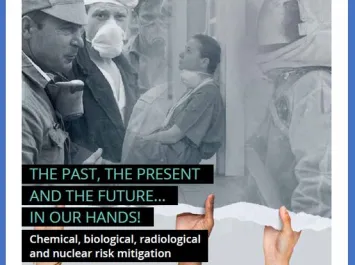The European Union (EU) Chemical, Biological, Radiological and Nuclear (CBRN) Risk Mitigation Centres of Excellence (CoE) Initiative’s Regional Secretariats for South East and Eastern Europe (SEEE) and Central Asia (CA) have successfully completed the 4th Online Webinar on Laboratory Diagnostics and Virology. More than 50 participants attended the interregional online webinar which was held on 3 November 2020. This event brought together National Focal Points, CBRN national experts, representatives of the relevant ministries and agencies coming from both SEEE and CA regions, as well as representatives of the European Commission and the United Nations Interregional Crime and Justice Research Institute (UNICRI).
The webinar was opened by Mr. Tristan Simonart, CBRN CoE Programme Manager, EU CBRN Risk Mitigation Centres of Excellence, Directorate-General for International Cooperation and Development (DG DEVCO), European Commission (EC). He underlined the importance of interregional cooperation between the South East and Eastern Europe and Central Asia regions, which serves as an exemplary model of cooperation within the framework of the EU CBRN CoE Initiative.
Four distinguished experts from France, Italy, Tajikistan, and the World Health Organization (WHO) were invited to share their expertise in the field of laboratory diagnostics and virology. The importance of networking in the emergence of a new pathogen with pandemic potential was underlined by Dr Jean-Claude Manuguerra, the Head of the Expertise and Research Unit of the laboratory for urgent response to biological threats, and Deputy Director of the French National Reference Centre for hantaviruses at the Institute Pasteur in Paris.
In her presentation, Dr. Paola Stefanelli the Director of Vaccine Preventable Diseases-Reference Labs Unit and Head of Regional Reference WHO Collaborating Centre for reference and research on poliomyelitis, at the Department of Infectious Diseases, National Public Health Institute, highlighted the Italian experience on COVID-19 laboratory response.
The Head of Virology Laboratory of the Tajik Research Institute of Preventive Medicine, Dr. Farida Tishkova, spoke about COVID-19 laboratory diagnostics in her country. The webinar concluded with the presentation from Dr. Marco Marklewitz, Laboratory Expert, High Threat Pathogens, WHO Regional Office for Europe, Health Emergency Programme. He updated participants about a new WHO interim guidance and practical applications of the Antigen-detecting rapid diagnostic tests (Ag-RDTs) in SARS-CoV-2 infections.
The webinar participants shared their experiences in the field of SARS-CoV2 diagnostic, techniques and biosafety aspects, collection of specimens for laboratory diagnosis, molecular assays to diagnose SARS-CoV2, and diagnostics implementation process. The primary focus of the discussions were the early creation of a COVID-19 reference laboratory network, multiple laboratory testing strategy, differential diagnosis COVID-19 versus flu, system resilience amid increasing testing demand, and evidence towards common testing strategies.
Invited experts extensively discussed about advantages and limitations of Ag-RDTs, its practical applications, example of the potential use in a scenario without (Polymerase Chain Reaction) PCR capacity. The participants were informed about development of online courses by the WHO targeting lab and health professionals along with training packages on performing RDTs for SARS-CoV-2 testing.
The idea of hosting a series of webinars along with its content came into being after receiving feedback from partner countries of the South East and Eastern Europe (SEEE) region, as part of their response to the European Union’s CBRN Centres of Excellence (CoE) Survey on National Needs and Support during the COVID-19 Crisis. The Survey was disseminated in April 2020, whereby ten partner countries of the SEEE region prioritized their individual country response and additional needs that were identified to fight the COVID-19 pandemic.
Since the second half of 2020, the Regional Secretariats for SEEE and CA organized four interregional online webinars focusing on Case and Contact Management, Clinical Case Management and Infection Detection and Control, and two webinars on Laboratory Diagnostics and Virology in July, September, October and November 2020 respectively. Two more online webinars covering the COVID-19 Risk Communication and Community Engagement as well as Interagency Coordination, will be scheduled in November and December respectively. The inter-regional webinars are conducted with simultaneous English-Russian interpretation provided with support of the EU CBRN CoE Project 53.



